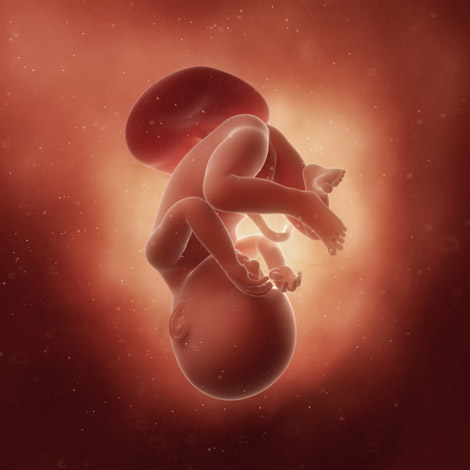Your baby this week
POUNDS IN WEIGHT
He’s really looking plumper now and soft-skinned.
His lungs are continuing to mature.
His major organs have developed.
How big is your baby?
At week 38 he weighs around 3 kg (6.8lb) and measures 49.8cm (19.6in) which makes him about the length of a humble leek.

How big is your baby?
At week 38 he weighs around 3 kg (6.8lb) and measures 49.8cm (19.6in) which makes him about the length of a humble leek.

What does your baby look like?
He’s really looking plumper now and soft-skinned. His major organs have developed and are ready for life outside the uterus. He also has a firm grasp which you’ll see first-hand when he grips one of your fingers after birth.
Changes in your body this week
By now you are probably feeling huge and uncomfortable. But don’t despair – you’re nearly there. Plus, if you’re feeling pressure low down in your pelvis, this is most likely due to your baby moving downwards in preparation for his entrance, which means that you have your lungs have more space again and your breathlessness may fade away.
How your baby is developing
All systems are nearly go. However, there is still some last minute development being done. His lungs are continuing to mature and will be producing surfactant (the substance which stops the air sacs in his tiny lungs from sticking together once he’s born).
And he’s continuing to lay down fat, which means you can look forward to squishy, newborn cuddles very soon.

How your baby is developing
All systems are nearly go. However, there is still some last minute development being done. His lungs are continuing to mature and will be producing surfactant (the substance which stops the air sacs in his tiny lungs from sticking together once he’s born). And he’s continuing to lay down fat, which means you can look forward to squishy, newborn cuddles very soon.

Health concerns
Leaking breasts before the birth? Totally normal. Your breasts can actually start to leak colostrum any time in the third trimester. This fluid comes before breastmilk and is full of antibodies for your baby. It can also be digested more easily because there’s less fat and sugar than breastmilk will have. If the leaking is bothering you, just slip a breast pad into your bra for extra protection.
Are there any symptoms you should be looking out for?
Coughs and colds are normally harmless for your baby, but there are some other infections out there which are more serious if you catch them during pregnancy:
- Listeriosis
- Toxoplasmosis
- Chicken pox
All of these can be passed from mother to baby whilst he’s in utero, during birth and sometimes after. Bearing this in mind, you should contact your doctor if you start having flu-like symptoms such as fever, chills, nausea and vomiting and especially if you know that you’ve been exposed to a virus.
It’s also worth remembering that listeriosis can be caught from farm animals, so if you happen to be at a petting farm with your toddler then stay away from the livestock and make use of the anti-bacteria gel just in case.
Safety first
As you reach the end of your pregnancy, you may well experience the ‘nesting instinct’, so-called because pregnant women are preparing their nest for the new baby. Other factors such as hormones and increased adrenaline also play a part. There’s nothing wrong with having a super-clean home in the last few weeks of pregnancy, but stay safe while you’re doing it. That means no heavy lifting, no balancing on ladders to get to awkward places with your duster, and a fair amount of listening to your body – it will probably be requesting frequent rests, hydration and plenty of snacks.

Important issues this week
Week 38 sees your last routine antenatal appointment. You’ll only see your midwife again if you go overdue. So this is your chance to ask any last minute questions. If you’re unsure of something, or you want to discuss pain relief or tips for labour, just write it down keep it with your maternity notes for safekeeping.
Keeping fit, staying healthy
It’s time to think about life with a newborn. Staying healthy and being able to cope have a lot to do with maintaining the right diet. So, clear out your fridge – bin any outdated/unwanted food and stock up on healthy essentials. This can include milk, cheese, yoghurt, juices, pre-washed salads, fruit and maybe even a roast chicken that can easily be turned into snacks and meals.
Looking forward; planning ahead
Again, it’s time to think about post-birth life. It’s important to eat nutritiously after the birth as this will help to keep your energy levels up. However your available opportunities for cooking are likely to be severely curtailed once your little one has arrived, so now is the time to cook and freeze home-made meals. Casseroles, fishcakes and pasta sauces such as Bolognese, are all simple to make and freeze – then out of the freezer, into the microwave and you can have a healthy, nutritious dinner ready in minutes.



